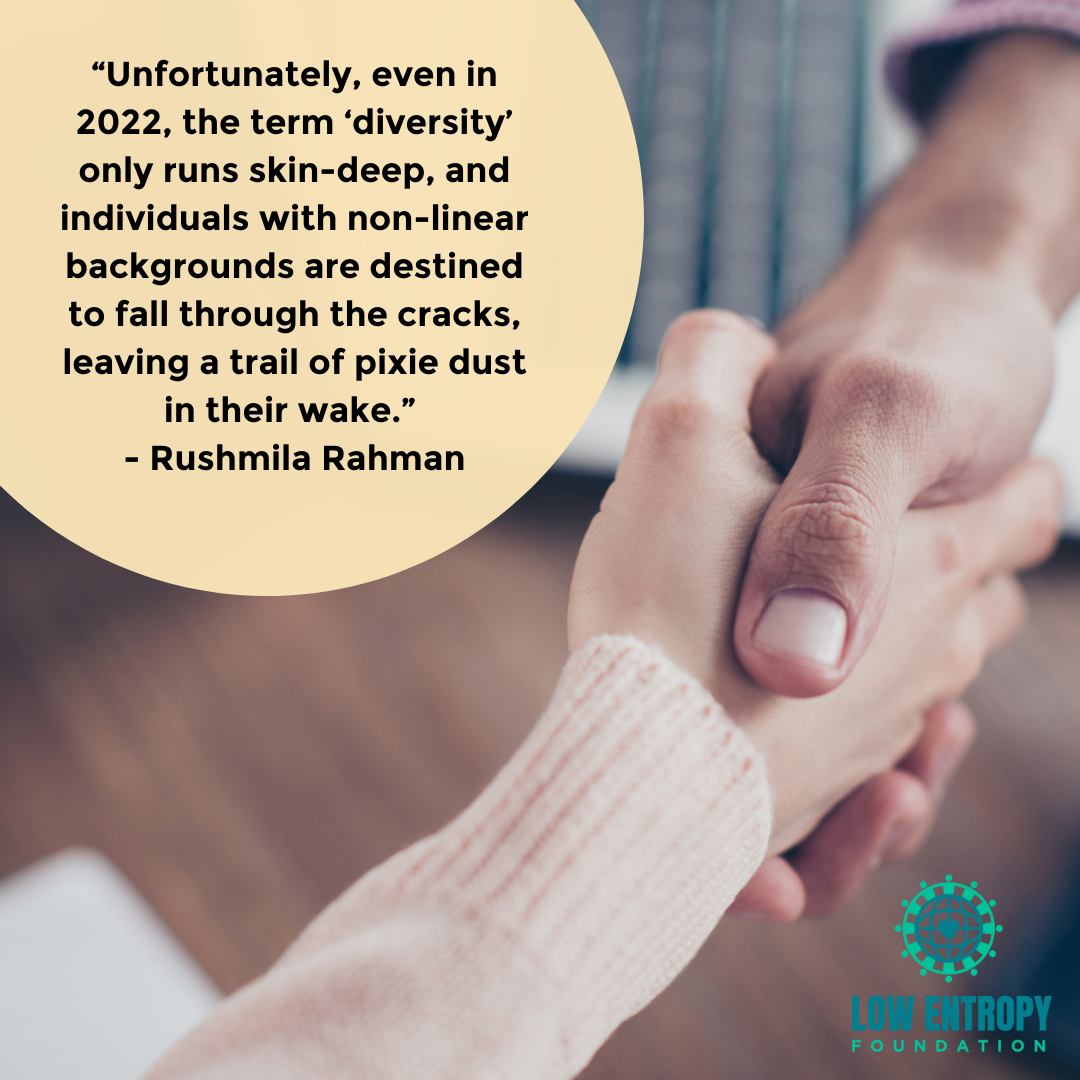Rushmila Rahman, Low Entropy Volunteer Writer
Over the last two years, I noticed my voice slowly starting to fade.
At first I blamed it on the pandemic – like most things – but that didn’t seem to deter the casual and undeniable shedding of the confident chord that held my sentences together. In a panic, I started focusing my energy on making my voice louder, my thoughts clearer and my words more polished. Yet I felt less heard than ever, and the more I looked in the mirror, the more I started to imagine pixie dust in place of words coming out of my mouth.
I couldn’t help but wonder: was it really just the pandemic?
The last two years have also seen me transition from one stage of life to another: I graduated and traded my “student” status for an “unemployed” one. With so many recent reports of employees resigning, combined with LinkedIn declarations that the future lies in hybrid work options, you’d think that it would be easy to find a job in my field.
Not exactly.
Job postings nowadays have a few common keywords that stood out to me: dynamic. Diverse. Detail-oriented. Expert demonstrable knowledge. Digital expert. Marketing expert. Regardless of the company’s use of such nouns and adjectives to describe their perfect candidate, they all seemingly wanted the same thing: expertise.
If you search for “entry-level jobs requiring experience,” you’ll read that applicants like myself are supposed to ignore the minimum two-to-four year requirement and “just apply anyway.” Yet, before submitting the application, a little pop-up box asks me to put down (in numerical figures only) my years of experience doing X, Y and Z.
Most organizations claim to be diverse in their hiring practices but their cultures are still quite static and old-fashioned. As more complex, dynamic job-seekers flood the market, companies increasingly seem to respond by shrinking their office spaces and boarding up their windows. It’s like something out of Shakespeare: “No, Time, thou shalt not boast that I do change.”
My academic and professional background may not be a long scroll, but it does showcase my skills in this field. Despite my work experience and a highly specific degree, I’m weeded out as an under-qualified candidate because of the ancient and quite paradoxical practice of judging someone’s qualification for an entry-level job based on their years of experience. This tells me that all this community really cares about is that numerical value that tells them how long I’ve been doing what I’m applying to do. As if qualified people cannot be dynamic, non-linear individuals who have the tenacity to explore various interests and still climb up.
In his book Think for Yourself, Vikram Mansharamani writes that our love affair with specialization has surpassed all limits and imposed mental conditions (or walls) that box us in. According to his research, “experts are less accurate predictors than non-experts in their areas of expertise” because it’s difficult for them to “successfully navigate the vague situations that are more prevalent today than ever before.” As Mansharamani puts it, “breadth of perspective trumps depth of expertise in uncertain domains.” And since organizations nowadays want people to unlearn and relearn continuously, generalists are better suited to navigate the ever-changing future of any company.
Yes, experts are valuable; and no, it’s not a fair world, but are companies really being “dynamic” and “diverse” by asking for years of experience for entry-level positions? Or are they just carrying out the age-old tradition of using their hiring practices to exploit periodic surges in the number of those unemployed in the market?
Anyone can learn the skills that a given job requires. That’s why there is orientation, a probationary period and a hierarchy of positions in a company – these act as safeguards for the production line and the company’s coffers. And yet they want us to believe that hiring experts at entry-level wages is the most sustainable way to move forward? Unfortunately, even in 2022, the term “diversity” only runs skin-deep, and individuals with non-linear backgrounds are destined to fall through the cracks, leaving a trail of pixie dust in their wake.
I believe Tinker Bell is a great analogy in this situation. As a job-seeker, I feel my voice getting increasingly silenced and my personhood gradually erased the more jobs I apply to. When I apply for positions that line up with my skills and interests, the same ones with long-drawn posts and application methods, with pages of questions on top of a resume and cover letter requirement, only to be weeded out by a little pop-up box, I might as well sprout a pair of wings and fly away to Neverland, because all those words mean nothing next to that numerical figure used to determine my qualification.
The sheer lack of trust on the part of companies when screening potential employees places applicants in a position of absolute submission (mostly through arcane application processes) and otherization. Just like how Tinker Bell’s existence relied on the collective faith of those around her, the growth of the hiring company relies on having faith in those who want to work for it.
As a community, enough emphasis needs to be placed on diversity and non-linear backgrounds, in the truest sense of these terms. Only when we are able to foster an environment that celebrates risk-takers and dreamers will we keep the Tinker Bells of this world from vanishing into thin air.
—
Rushmila Rahman is a writer, editor and communications professional based in Vancouver, BC.







